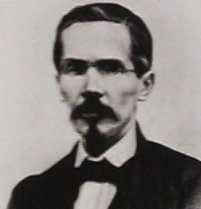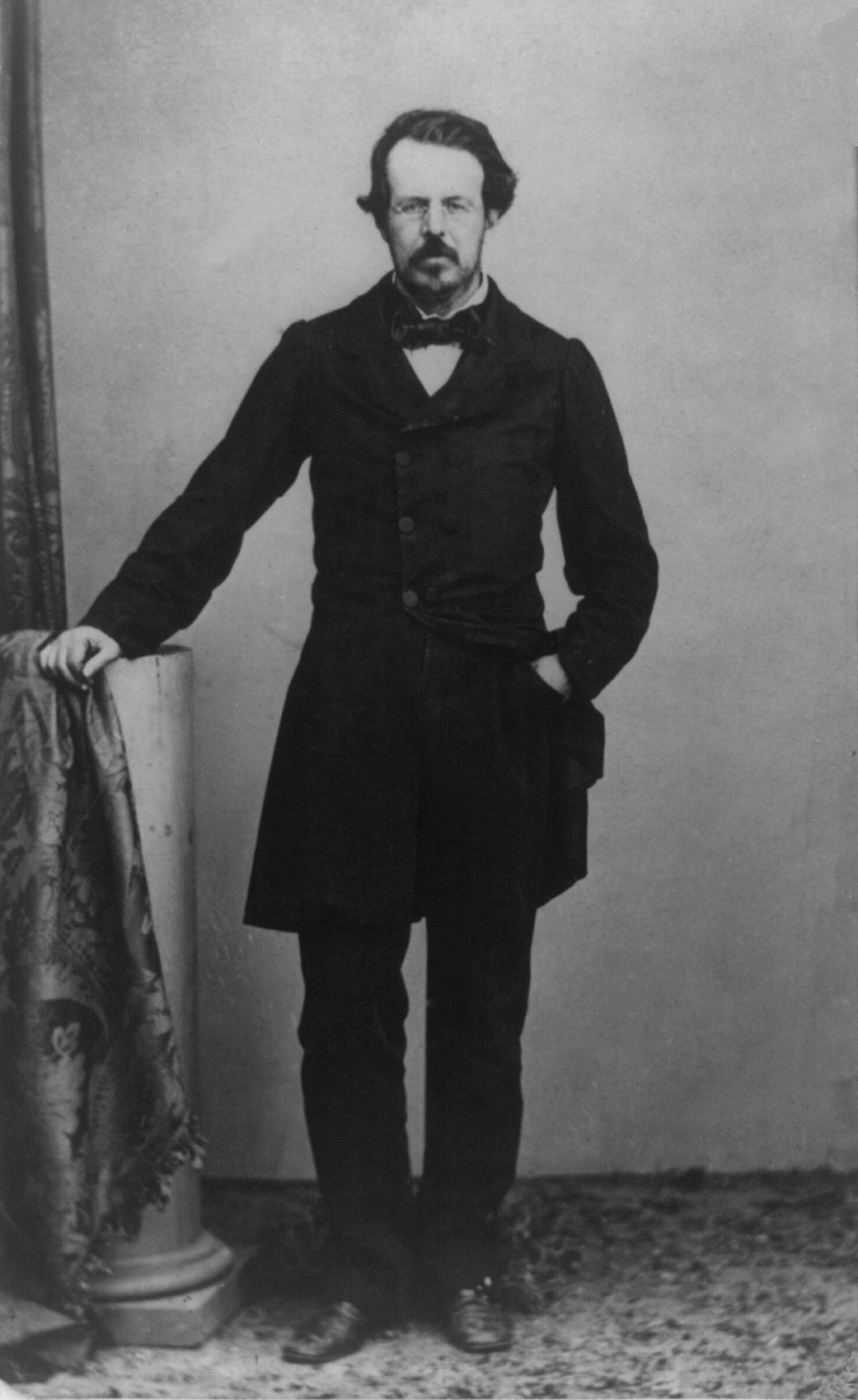|
José María Patoni
José María Patoni was a Mexican liberal military commander and governor of the State of Durango during the Reform War and the Second French Intervention in Mexico. During the French Intervention, a dispute arose over succession to the presidency, and he supported the claims of Jesús González Ortega as opposed to those of acting president Benito Juarez leading to Patoni's arrest. Upon his release in 1868, he was kidnapped and murdered by General Benigno Canto, leading to rumors and an allegation from Canto himself that he was acting upon orders from Minister of War Ignacio Mejía, an accusation which the government vehemently denied. Benigno would be tried and sentenced to ten years imprisonment. Early life He was the second son of Mercedes Sánchez and Juán Bautista Patoni, a native of Tyrol, Austria (then part of the Austrian Archduchy). He was born in 1828 in Santiago Papasquiaro, State of Durango. He lived there until 1858 engaged in mining, playing a key role in develop ... [...More Info...] [...Related Items...] OR: [Wikipedia] [Google] [Baidu] |
Governor Of Durango
Under the Political Constitution of the Free and Sovereign State of Durango, the exercise of the Executive authority of this Mexican government unit is reserved for an individual known as the Constitutional Governor of the Free and Sovereign State of Durango. This post is held for a period of 6 years, and no re-election is permitted. The governor's term begins on September 15 of the year of the election and finishes on September 14 after having passed six years. The post is open to all citizens meeting the following criteria: a natural born citizen of Mexico, at least 30 years of age, and a resident of Durango for an unbroken period of 5 years prior to election. Governors of the Free and Sovereign State of Durango *(1936–1940): Enrique R. Calderón *(1940–1944): Elpidio G. Velázquez *(1944–1947): Blas Corral Martínez *(1947): Francisco Celis *(1947–1950): José Ramón Valdés *(1950–1956): Enrique Torres Sánchez *(1956–1962): Francisco González de la Vega * ... [...More Info...] [...Related Items...] OR: [Wikipedia] [Google] [Baidu] |
Santos Degollado
José Santos Degollado Sánchez (born November 1, 1811, in Hacienda de Robles, Guanajuato – died June 15, 1861, in Llanos de Salazar, State of Mexico) was a Mexican Liberal politician and military leader. He was raised by a priest in Michoacán and worked twenty years in the cathedral in Morelia. He became a Federalist in 1836 and entered politics in 1845 when he was elected to the Michoacán legislature in 1845. He replaced his close associate Melchor Ocampo as governor of Michoacán 27 March - 6 July 1848. He joined the Revolution of Ayutla. He became governor of Jalisco when the liberals successfully ousted Antonio López de Santa Anna. As with a number of rising Liberals, Degollado was not formally trained as a soldier, but gained military experience in the Revolution of Ayutla. He later fought for Benito Juárez's government. During Benito Juárez's presidency he served as Secretary of War and Navy and as Secretary of External Affairs. Degollado was a close friend of Guil ... [...More Info...] [...Related Items...] OR: [Wikipedia] [Google] [Baidu] |
1868 Deaths
Events January–March * January 2 – British Expedition to Abyssinia: Robert Napier leads an expedition to free captive British officials and missionaries. * January 3 – The 15-year-old Mutsuhito, Emperor Meiji of Japan, declares the ''Meiji Restoration'', his own restoration to full power, under the influence of supporters from the Chōshū and Satsuma Domains, and against the supporters of the Tokugawa shogunate, triggering the Boshin War. * January 5 – Paraguayan War: Brazilian Army commander Luís Alves de Lima e Silva, Duke of Caxias enters Asunción, Paraguay's capital. Some days later he declares the war is over. Nevertheless, Francisco Solano López, Paraguay's president, prepares guerrillas to fight in the countryside. * January 7 – The Arkansas constitutional convention meets in Little Rock. * January 9 – Penal transportation from Britain to Australia ends, with arrival of the convict ship ''Hougoumont'' in Western Australi ... [...More Info...] [...Related Items...] OR: [Wikipedia] [Google] [Baidu] |
1828 Births
Eighteen or 18 may refer to: * 18 (number), the natural number following 17 and preceding 19 * one of the years 18 BC, AD 18, 1918, 2018 Film, television and entertainment * ''18'' (film), a 1993 Taiwanese experimental film based on the short story ''God's Dice'' * ''Eighteen'' (film), a 2005 Canadian dramatic feature film * 18 (British Board of Film Classification), a film rating in the United Kingdom, also used in Ireland by the Irish Film Classification Office * 18 (''Dragon Ball''), a character in the ''Dragon Ball'' franchise * "Eighteen", a 2006 episode of the animated television series ''12 oz. Mouse'' Music Albums * ''18'' (Moby album), 2002 * ''18'' (Nana Kitade album), 2005 * '' 18...'', 2009 debut album by G.E.M. Songs * "18" (5 Seconds of Summer song), from their 2014 eponymous debut album * "18" (One Direction song), from their 2014 studio album ''Four'' * "18", by Anarbor from their 2013 studio album '' Burnout'' * "I'm Eighteen", by Alice Cooper common ... [...More Info...] [...Related Items...] OR: [Wikipedia] [Google] [Baidu] |
Mexican Generals
Mexican may refer to: Mexico and its culture *Being related to, from, or connected to the country of Mexico, in North America ** People *** Mexicans, inhabitants of the country Mexico and their descendants *** Mexica, ancient indigenous people of the Valley of Mexico ** Being related to the State of Mexico, one of the 32 federal entities of Mexico ** Culture of Mexico *** Mexican cuisine *** historical synonym of Nahuatl, language of the Nahua people (including the Mexica) Arts and entertainment * "The Mexican" (short story), by Jack London * "The Mexican" (song), by the band Babe Ruth * Regional Mexican, a Latin music radio format Films * ''The Mexican'' (1918 film), a German silent film * ''The Mexican'' (1955 film), a Soviet film by Vladimir Kaplunovsky based on the Jack London story, starring Georgy Vitsin * ''The Mexican'', a 2001 American comedy film directed by Gore Verbinski, starring Brad Pitt and Julia Roberts Other uses * USS ''Mexican'' (ID-1655), United Stat ... [...More Info...] [...Related Items...] OR: [Wikipedia] [Google] [Baidu] |
Governors Of Durango
A governor is an administrative leader and head of a polity or political region, ranking under the head of state and in some cases, such as governors-general, as the head of state's official representative. Depending on the type of political region or polity, a ''governor'' may be either appointed or elected, and the governor's powers can vary significantly, depending on the public laws in place locally. The adjective pertaining to a governor is gubernatorial, from the Latin root ''gubernare''. Ancient empires Pre-Roman empires Though the legal and administrative framework of provinces, each administrated by a governor, was created by the Romans, the term ''governor'' has been a convenient term for historians to describe similar systems in antiquity. Indeed, many regions of the pre-Roman antiquity were ultimately replaced by Roman 'standardized' provincial governments after their conquest by Rome. Plato used the metaphor of turning the Ship of State with a rudder; the Latin w ... [...More Info...] [...Related Items...] OR: [Wikipedia] [Google] [Baidu] |
Guillermo Prieto
Guillermo Prieto Pradillo (10 February 1818 – 2 March 1897) was a Mexican novelist, short-story writer, poet, chronicler, journalist, essayist, patriot and Liberal politician. According to Eladio Cortés, during his lifetime he was considered Mexico's national poet, and his political allegiance to the Mexican liberals allowed him to serve as Minister of Finance and Foreign Affairs under different administrations. In his writings he used several pen names, including Don Benedeno and Fidel. Early years Prieto was born in Mexico City, the son of José María Prieto Gamboa and Josefa Pradillo y Estañol. His childhood was spent near Molino del Rey (King's Mill), next to the historic Chapultepec Castle, since his father administered the mill and the associated bakery. When Prieto was 13 his father died and his mother had a nervous breakdown. Andrés Quintana Roo and Fernando Calderón took him under his protection, and he was thus able to continue his studies. After working ... [...More Info...] [...Related Items...] OR: [Wikipedia] [Google] [Baidu] |
Cayetano Mascareñas
Cayetano is a Spanish and sometimes Sephardic Jewish name related to the Italian name Gaetano (English: ''Cajetan''), both from Latin ''Caietanus'', meaning "from Gaeta". It is a common given name in Spain, Mexico, Argentina and the Philippines. As a surname, it is also found predominantly in those countries, as well as Peru. The feminine version of the name is Cayetana. People Given name * Saint Cajetan, Italian Catholic priest and religious reformer * Cayetano (Giorgos Bratanis), Greek musician * Cayetano Apablasa (1847–1889), American land owner and politician * Cayetano Arellano (1847–1920), Chief Justice of the Supreme Court of the Philippines * Cayetano Biondo (1902–1986), Argentine film actor * Cayetano Carpio (1918–1983), leader of the Communist Party of El Salvador * Cayetano Coll y Cuchí (1881–1961), Puerto Rican politician * Cayetano Coll y Toste (1850–1930), Puerto Rican historian and writer * Cayetano Cornet (b. 1963), Spanish athlete * Cayetano Corona Gasp ... [...More Info...] [...Related Items...] OR: [Wikipedia] [Google] [Baidu] |
Pedro Hinojosa
Pedro Hinojosa de la Garza Falcón (31 January 1822, Matamoros, Tamaulipas - 5 March 1903, Mexico City) was a Mexican politician and military general who fought in the Mexican–American War, the Reform War, and in the French intervention in Mexico. In addition, Hinojosa was governor of Durango, Nuevo Leon, and Chihuahua, and served as Secretary of War and Navy. Military career Pedro Hinojosa was born in Matamoros, Tamaulipas to Ramón Hinojosa and his wife Mamerta de la Garza Falcón. Hinojosa eventually enlisted in the National Guard of Tamaulipas at the age of 18. In Tamaulipas, he fought the Texan rebels and the Apache and Comanche tribes, who maintained determined against the government. In 1848, during the Mexican–American War, Hinojosa rose through the ranks and became a lieutenant. He continued to defend Tamaulipas through its national guard until 1854, the year he was elected as a lieutenant colonel due to his efforts in protecting local territories from the Texan ... [...More Info...] [...Related Items...] OR: [Wikipedia] [Google] [Baidu] |


